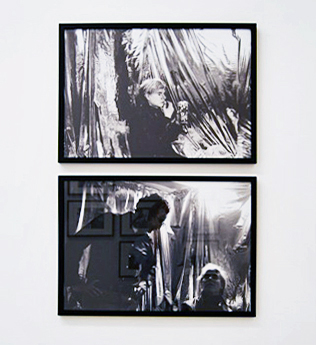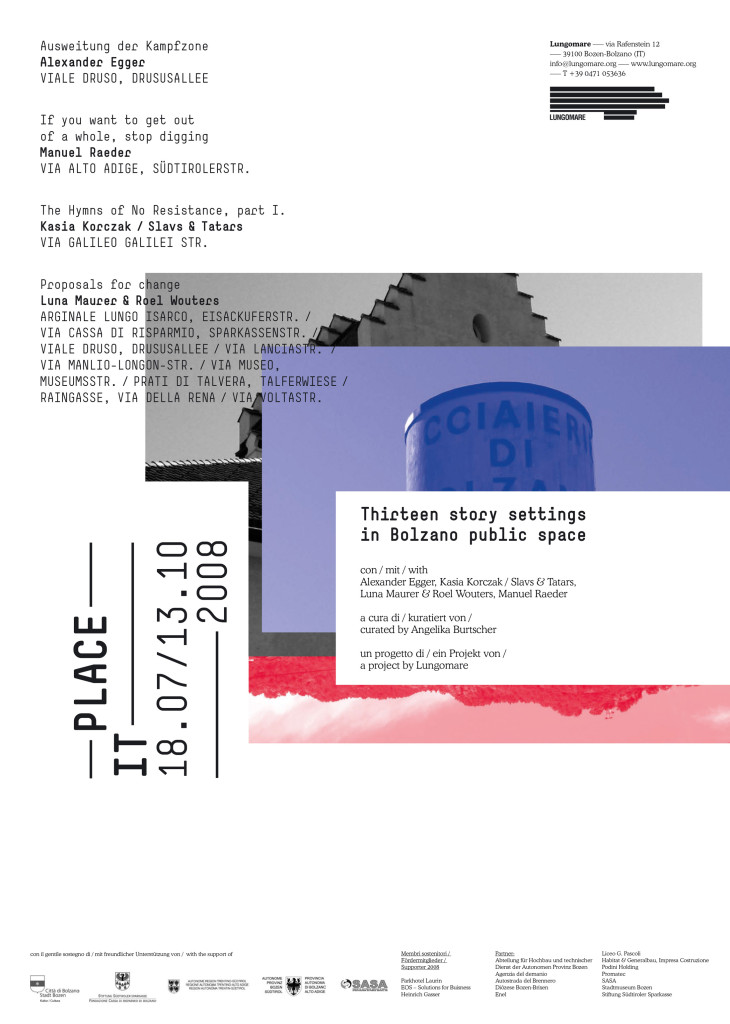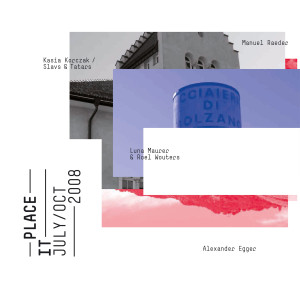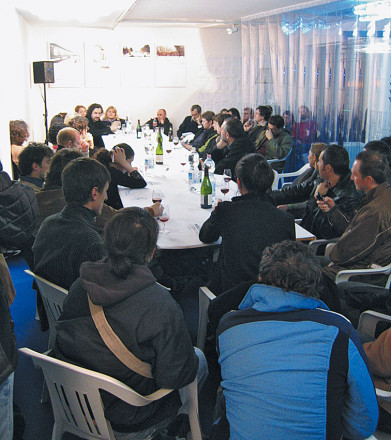Place it
Thirteen story settings in Bolzano public space
The exhibition project “Place it” invite graphic designers to come to Bolzano and reflect on context-related geopolitical and sociocultural issues through four graphic art interventions in the public space. The project will transform vertical wall surfaces in the city of Bozen into exhibition venues. “Place it” aims in addition to draw attention to the relevance and the impact of visual communication in our contemporary culture.
The project
“Place it” makes use of instruments of visual communication. The project intervenes in four public places in the city in order to creatively explore its history, present state and future prospects. The interventions take as their point of departure already existing surfaces and buildings in four selected city areas. These characterize and encapsulate the architectural and social structure of the city of Bolzano: the historic center, the expansion zone of the 1930s, the residential area developed in the 1960s and 70s, and the industrial zone.
Graphic designers were deliberately chosen as those shaping the exhibition. Graphic design and advertising serve clearly defined functions, such as recognizability, functionality, legibility and expressiveness. The exact means chosen however depend on the designer’s own subjective imagination as he tries to find the right visual communication solutions for his customers. Graphic design stands for even more than this, though. In the current century it has increasingly developed into an independent visual language that has become part of our culture and a conveyer of social, political and cultural beliefs. place it connects this sociopolitical relevance of graphic design with its fundamental functions, and at the same time experiments with its power to express and visualize themes relevant to the geopolitical and sociocultural concerns of a city.
At the center of the project is the concept of “visual learning”. “Place it” involves communication interventions without a sender and with strong communicative potential for opening up room for discussion and reflection.
The project focuses attention on the message, tying it to very concrete location-related concerns in the city of Bolzano and communicating the stories told to a wide audience. Four international graphic designers or teams will be invited to stage a graphic intervention in four different urban areas. These interventions may be two- or three-dimensional, and may entail active communication or passively encourage reflection on their context-related content.
A show during the European Biennale Manifesta 7 in South Tyrol/Trentino.
Public space in Bolzano
Lungomare
Manuel Raeder
Manuel Raeder reflects about the possible artistic interpretations of free space/tolerance. His design intervention becomes reflective design, an approach which he has already been testing for several years and for which he has been trying to find new definitions.
Fences originally exist to keep someone in or out. They are the exact opposite to openness or an open door where exchange and passage are possible. The starting point of this work is that of the current policy on immigration in Italy and EU. On the one hand borders are declared open, yet on the other hand the conditions for immigrants are becoming more and more complex, so much so as to make it hard for them to live a normal life.
With a fence, formed as a semicircular element, Manuel Raeder represents a part of the facade of the diocese of Bozen-Brixen in via Alto Adige in Bozen and allows his three-dimensional intervention to become a means of communication. His bent fence does not form a wall, but allows one to see through. The intervention in the centre will be animated with different materials forming words and patterns. These will change regularly throughout the exhibition period of the “Place it” project. The choice of location in the square next to the bus station was intentional, as it is a place of arrival in and departure from Bozen.
Luna Maurer und Roel Wouters
“Proposals for change” is an exercise without an objective, but which is based on the main idea that it is possible to change daily habits. Singular letters form words and these become sentences. It is about simple instructions, neither radical nor politically minded, which everybody can experience because they are taken from daily life. These are small, thought-provoking impulses, aimed at making the audience aware of everyday life, place, and origin, to the extent of reconsidering identity and reflecting on these issues. The ten sentences are exemplary and can be continued indefinitely.
Since we are in a country whose beauty is part of our collective consciousness, and where traditions and culture are intensively cultivated/maintained, the fear of losing them is all the stronger. A fear which leads to an increasing, ostentation and display of identity, which is often, when seen from a distance, perceived as a kind of forced rigidity. This exercise will remove fear of loss of identity and cultural heritage and encourage people to think differently.
Luna Maurer und Roel Wouters: Proposals for change
Alexander Egger
A word game where languages get mixed and points of reference are modified. The viewer is offered particular versions, relations and coherent perceptions depending on their own perspective. An attempt to make positions flexible: Each viewer recognises themselves as part of one group, but is simultaneously making up part of the other group from which they are excluded. The alien, the new, and the unknown form part of their own reality, just as the known and established do.
Established, defensive strategies of identity, which define and exhaust themselves through the social affiliation to an ethnic group, and the consequent separation from other ethnic groups in the country, are forced open by the broadening and inclusion of other apparent and visible realities such as tourists, migrant labourers. “Expansion of combat zone” brings uncertainty, but also depicts the dynamics of cultural hang-ups and the network of relations and refusal. The increase in complexity has to be seen as possibility for discourse.
Kasia Korczak / Slavs & Tatars
You say Autonomie, I say autonomia, So if you like Einwanderer and I like immigrante,
you say Integrierung and I say integrazione, I’ll be pro-Einwanderer and be anti-immigrante
Autonomie, autonomia, Integrierung, integrazione, for we know we need each other so we,
let’s call the whole thing off, better call the calling off, off.
Appropriating the lyrics of the classic Gershwin song, “Let’s call the whole thing off”, Slavs and Tatars proposes a re-reading of the comic track, sung by Fred Astaire and Ginger Rogers in “Shall We Dance?”. Here, the contention focuses not on seemingly innocent words such as tomato or banana, but rather on terminology that touches the very issues pre-occupying Europeans today: immigration, identity, self-determination, etc. In an area that has had its fair share of experience dealing with such polemics, South Tyrol is an ideal setting for a public celebration of contention, as opposed to the often consensual approach advocated by those in power.
Autonomous Province of Bozen/Bolzano-South Tyrol, Cultures Departments
Autonomous Region Trentino-Alto Adige
Fondazione Cassa di Risparmio
Città di Bolzano, Cultures Department
Finstral
Sasa
Supporter 2008:
Parkhotel Laurin, EOS – Solution for Business, Heinrich Gasser
What´s on
EXHIBITION :: Binta Diaw :: Collective Practices – A Living Experience of Feeling ListenedAbout Lungomare
Lungomare, a cultural association founded in Bolzano in 2003, was created from the desire and necessity to open a space in which to share differences, experiences, opinions and desires, a space in which to make the link between cultural production and the political and social dimension. Lungomare undertakes projects that investigate and test possible relationships between design, architecture, urban planning, art and theory, the results of which are presented in different formats: public discussions, conferences, publications, exhibitions and interventions in public spaces. All these formats are characterised by the intention to interact with cultural and socio-political processes relating to the region in which Lungomare is located.
Currently Lungomare’s activities focus on long-term residency projects, a format whereby Lungomare invites guests to engage and interact within the context of South Tyrol. Lungomare’s activities are based on three principles: specific attention to the context in which the association’s projects are undertaken, the transdisciplinary approach that distinguishes these projects, and reflection on the role of Lungomare as a cultural institution in connection with the region in which it operates.
Territory
Lungomare is located at the edge of Bolzano, the capital of South Tyrol, and relates to the context in which it operates, attempting to highlight the dynamics of change. Large urbanized areas alternate with broad areas of intensive cultivation and yet others of picturesque landscape, all of which penetrate the centre of the city. The city is surrounded by mountains and this is one of the reasons why the tourism industry has become a driving force in this locality. The demographic structure of the city has been characterized for a long time by the coexistence of two populations, those speaking German and those speaking Italian. However, the social and demographic composition of Alto Adige Südtirol is changing. Migrants, including those from non-European countries are making their way to the area to settle, whilst others, including political refugees, are flowing through the region.





